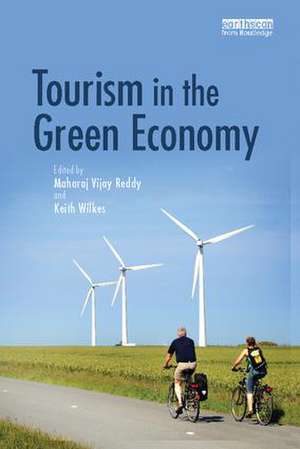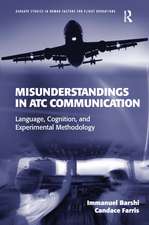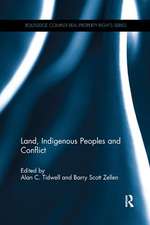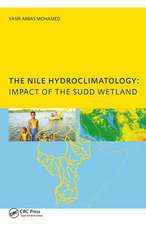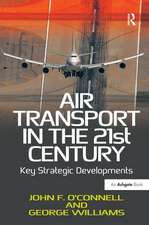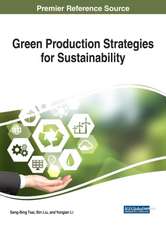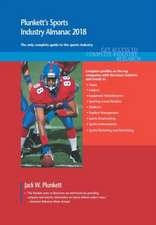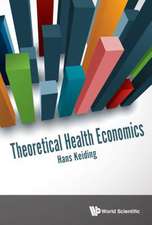Tourism in the Green Economy
Editat de Maharaj Vijay Reddy, Keith Wilkesen Limba Engleză Paperback – 25 mai 2017
In this context, this book provides consensus about what the green economy entails, what role tourism can play in a green economy, early responses from many countries, on-going and emerging research initiatives that will enable tourism’s transition to a green economy. The chapters address three key themes: understanding the Green Economy concept and the role of tourism; responses and initiatives in greening tourism; and emerging techniques and research implications. A wide range of case studies from around the world and in different contexts is included to demonstrate the extent of the challenge and range of opportunities for the tourism industry.
| Toate formatele și edițiile | Preț | Express |
|---|---|---|
| Paperback (1) | 460.74 lei 43-57 zile | |
| Taylor & Francis – 25 mai 2017 | 460.74 lei 43-57 zile | |
| Hardback (1) | 1069.58 lei 43-57 zile | |
| Taylor & Francis – 15 iun 2015 | 1069.58 lei 43-57 zile |
Preț: 460.74 lei
Nou
Puncte Express: 691
Preț estimativ în valută:
88.16€ • 92.28$ • 73.38£
88.16€ • 92.28$ • 73.38£
Carte tipărită la comandă
Livrare economică 31 martie-14 aprilie
Preluare comenzi: 021 569.72.76
Specificații
ISBN-13: 9781138095632
ISBN-10: 113809563X
Pagini: 388
Dimensiuni: 156 x 234 x 27 mm
Greutate: 0.72 kg
Ediția:1
Editura: Taylor & Francis
Colecția Routledge
Locul publicării:Oxford, United Kingdom
ISBN-10: 113809563X
Pagini: 388
Dimensiuni: 156 x 234 x 27 mm
Greutate: 0.72 kg
Ediția:1
Editura: Taylor & Francis
Colecția Routledge
Locul publicării:Oxford, United Kingdom
Public țintă
Postgraduate and UndergraduateCuprins
Foreword Nikhil Seth, Director of the Division of Sustainable Development, UNDESA, New York Part 1: Understanding the Concept of Green Economy and the Role of Tourism 1. Introduction: Tourism in the Green Economy: Rio to Post-2015 Maharaj Vijay Reddy and Keith Wilkes 2. Defining the Green Economy and the Potential Role of Green Tourism Adrian C. Newton 3. Environmental Ethics and Challenges to Tourism’s Place in the Green Economy Andrew Holden 4. The Role of Nature-based Tourism in the Green Economy: A Broader Perspective for Conservation and Sustainability in the Philippines Corazon Catibog-Sinha 5. Understanding the Philosophy and Performance of Tourism and Leisure in Protected Areas for transition to a Green Economy Agita Livina and Dzintra Atstaja 6. Ecotourism Regulation and the Move to a Green Economy Colin Crawford, Jared Sternberg and Robert C. Cudd 7. China's Tourism’s March Forward: Towards a Green Transition or Unsustainable Tourism Michael O' Regan Part 2: Best Practices for the Greening of Tourism and Allied Industries 8. Green Jobs and Employment in Tourism Adele Ladkin and Edith Szivas 9. Sri Lanka and Tourism: The Need for a Green Economy Approach Jeremy Buultjens, Iraj Ratnayake and Athula Chammika Gnanapala 10. Responses and Green Tourism Initiatives from National Parks in Sabah, Malaysia Jennifer Kim Lian Chan 11. The Potential of Energy Tourism: A Multiple Case Study on Renewable Energy-based Tourist Attractions Lena-Marie Lun, Michael Volgger and Harald Pechlaner 12. Eco-Certification and Labelling Programs of Hotels in China: Policy Perspectives for Sustainable Tourism and a ‘Greener’ Economy Fu Jia and Ralph Wahnschafft 13. Working towards a Transition to Green Economy in Small Island Developing States: The Seychelles Rachel Welton 14. Destination Ukraine: Tourism Litmus of Transition to Green Economy Victoria Kiptenko and Pavlo Doan 15. Ecotourism as a Mechanism for Achieving a Green Economy in Developing Countries: Experiences from Ghana Patrick Brandful Cobbinah, Rik Thwaites and Rosemary Black 16. Local Food: Greening the Tourism Value Chain Susan L. Slocum 17. The Role of Green Events in a Green Economy Bill Merrilees, Dale Miller and Amelia Green Part 3: Research Implications and Emerging Issues 18. A Micro-Macro Assessment of Climate Change and Visitors to the Great Barrier Reef, Australia Tazim Jamal, Bruce Prideaux, Hana Sakata and Michelle Thompson 19. Investigating the Transition of the Tourism Industry towards a Green Economy in Samui Island, Thailand Gunjan Saxena, Nisarat Thaithong and Dimitrios Tsagdis 20. Greening the High-spend Visitor: Implications for Destination Marketing Emma Whittlesea, Victoria Hurth and Sheela Agarwal 21. Steps towards a Green Economy: Which Factors Contribute to the Social Inclusion and Economic Development of the Locals in the Brazilian Tourism Industry? Gilson Zehetmeyer Borda, Elimar Pinheiro do Nascimento, João Paulo Faria Tasso and Everson Cristiano de Abreu Meireles 22. Economic Greenwash: On the Absurdity of Tourism and Green Growth C. Michael Hall
Notă biografică
Maharaj Vijay Reddy is the Deputy Head of the Department for Marketing, Enterprise and Tourism within the Lord Ashcroft International Business School at Anglia Ruskin University in Cambridge, UK. Previously, he worked as a Lecturer, Senior Lecturer and Principal Lecturer in the Faculty of Management at Bournemouth University. Before joining Bournemouth, Vijay was at the University of Kent as a post-doctoral Research Associate within the Kent Business School. Vijay gained his PhD from the University of Exeter. He has completed challenging projects commissioned by international and national agencies, for example, research exploring disaster impacts following the 2004 Asian and 2011 Japanese tsunamis. His consultancies for UNESCO resulted in the inscription of natural and cultural properties on the UNESCO List. Vijay has been invited by policy organizations including UN Secretariat, UNEP, UNWTO and the Intergovernmental Oceanic Commission to comment on sustainability issues.
Keith Wilkes is the Executive Dean of Bournemouth University’s Faculty of Management, one of the world’s leading centres for tourism research and education. Keith was a UK Quality Assurance Agency (QAA) Subject Specialist Reviewer, and a long-standing member of the Association for Tourism in Higher Education (ATHE) Executive Committee. His research focuses on sustainable tourism development, visitor attractions, heritage management and tourism education. He has played a significant role in developing tourism education in the UK.
Keith Wilkes is the Executive Dean of Bournemouth University’s Faculty of Management, one of the world’s leading centres for tourism research and education. Keith was a UK Quality Assurance Agency (QAA) Subject Specialist Reviewer, and a long-standing member of the Association for Tourism in Higher Education (ATHE) Executive Committee. His research focuses on sustainable tourism development, visitor attractions, heritage management and tourism education. He has played a significant role in developing tourism education in the UK.
Recenzii
"This publication offers an objective assessment of the challenges faced by green economy and their application to the tourism sector, as well as opportunities for promoting a global and local sustainable tourism through resource efficiency, green jobs and sustainable consumption and production patterns. Tourism stakeholders will find inspiration in this book, from its multiple case studies, in defining and promoting methods and tools for implementing sustainable tourism while valuing local resources and educating the tourist community." – Arab Hoballah, Chief of the Sustainable Consumption and Production Branch, UNEP.
"We welcome this publication which covers the topic of tourism, and in particular the aspect of sustainable tourism, with the aim of providing useful insights on how tourism could adapt to green economy, and how to make tourism more sustainable" – Francesca Tudini, Head of Tourism Policy Unit, European Commission.
"This publication brings new insights into the need to green the rapidly-growing tourism industry. The case studies show the challenges and opportunities common to both developed and developing countries, echoing UNESCO’s efforts to build inclusive green societies and sustainable tourism through Biosphere Reserves, World Heritage (including marine) sites, and Geoparks." – Wendy Watson-Wright, Executive Secretary, Intergovernmental Oceanographic Commission and Assistant Director General a.i., Natural Sciences, UNESCO.
"Building on the outcome of Rio+20, the United Nations Department of Economic and Social Affairs, through its Division for Sustainable Development, has been working closely with the UN system, in particular, the World Tourism Organization and United Nations Environment Programme to advance sustainable tourism in the context of sustainable development and more specifically in national planning processes. In this regard, initiatives by the academic world to help policy makers and practitioners develop a better understanding of the dynamic and concrete linkages between tourism and sustainable development are therefore of great importance. This publication addresses the potential role that tourism could play towards a green economy. It also provides good practices, policy orientations as well as implications for future research in this area. The publication is therefore a timely and important input for tourism and sustainability stakeholders." – Nikhil Seth, Director, Division for Sustainable Development, United Nations Department for Economic and Social Affairs, United Nations Secretariat.
"We welcome this publication which covers the topic of tourism, and in particular the aspect of sustainable tourism, with the aim of providing useful insights on how tourism could adapt to green economy, and how to make tourism more sustainable" – Francesca Tudini, Head of Tourism Policy Unit, European Commission.
"This publication brings new insights into the need to green the rapidly-growing tourism industry. The case studies show the challenges and opportunities common to both developed and developing countries, echoing UNESCO’s efforts to build inclusive green societies and sustainable tourism through Biosphere Reserves, World Heritage (including marine) sites, and Geoparks." – Wendy Watson-Wright, Executive Secretary, Intergovernmental Oceanographic Commission and Assistant Director General a.i., Natural Sciences, UNESCO.
"Building on the outcome of Rio+20, the United Nations Department of Economic and Social Affairs, through its Division for Sustainable Development, has been working closely with the UN system, in particular, the World Tourism Organization and United Nations Environment Programme to advance sustainable tourism in the context of sustainable development and more specifically in national planning processes. In this regard, initiatives by the academic world to help policy makers and practitioners develop a better understanding of the dynamic and concrete linkages between tourism and sustainable development are therefore of great importance. This publication addresses the potential role that tourism could play towards a green economy. It also provides good practices, policy orientations as well as implications for future research in this area. The publication is therefore a timely and important input for tourism and sustainability stakeholders." – Nikhil Seth, Director, Division for Sustainable Development, United Nations Department for Economic and Social Affairs, United Nations Secretariat.
Descriere
This book provides a comprehensive set of tourism debates, early responses, on-going and emerging research initiatives that will enable tourism’s transition to a green economy.
